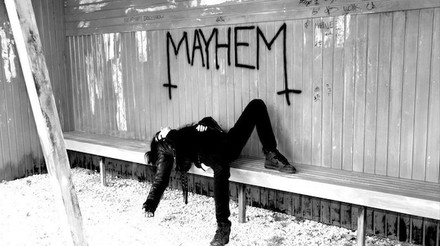
"This is not a joke," says a Norwegian blackmetaler while applying corpsepaint to the face of his chuckling accomplice. In real life -- and "Lords of Chaos" is based on actual incidents from the 1980s and '90s -- the reminder would have been unnecessary. But director Jonas Äkerlund wants to include a perception of black metal as silly hijinks so he can heighten the contrast between youth and establishment, between inchoate idealism and the deadly consequences of blind belief. "Lords of Chaos" is a morality play, not history, and Äkerlund is honest enough to admit from the beginning that he has based his story on lies as well as truth. But that doesn't prevent his repeated portrayals of black-metal clownishness from trivializing music based on serious impulses.
Dumb makeup, satanic posturing -- no artistic statement has grown more insipid than these rock clichés. Look back to their origins, though, and you find resonant metaphors. The young have always had reason to set themselves apart from previous generations' institutions. If they despise business suits and religious hypocrisies, well, good. For its part, Norwegian black metal targeted the Christian rites and invader power structures that forcibly supplanted indigenous pagan cultures. You call our gods devils? Then deviltry be your reward.
Early black-metal musicians, as the film shows, burned churches, murdered and committed suicide to express their alienation. Well, bad. If they often tapped their parents' money, that seems wrong but appropriate. Somehow, though, because they embraced swastikas as well as Satan, we differentiate them from Black Panthers, Weathermen, green saboteurs and even NRA gunhounds.
Amid this radical landscape, Äkerlund's focus gets a little fuzzy, perhaps rightly. His narrator, Euronymous (Rory Culkin), comes off as shrewd, extreme, creative, manipulative, hypocritical but capable of love. Human. And in a masterful performance evolving from naif to cold killer, Emory Cohen as Euronymous' foil Varg demonstrates the perils of inflexible, monomaniacal dedication. Varg chooses to be inhuman and therefore inferior, Äkerlund preaches, even if human ain't so great either.
Äkerlund steeps his tale in gore, paralleling the slasher flicks on which the blackmetalers gorge themselves. In fact his method seems gratuitously similar until the flinching viewer begins to realize with the 100th stab and the 50th bleeding closeup that Äkerlund is making point after point about the consequences of binding oneself too tightly to a negative creed. Or even a positive one, as Nero's Christian martyrs might have testified.
For a more accurate portrayal of Norwegian black metal's roots, try the 2008 documentary "Until the Light Takes Us." For something less than real and more than entertainment, the vividly shot and snappily paced "Lords of Chaos" will do very well.
Black-metal fans must judge whether the energy, commitment and skill of the music outweighs its destructive associations. Maybe we'll avoid murderer Varg's band Burzum and keep listening to church-burner Euronymous' band Mayhem. Maybe we'll compromise with the more theatrical and less political Dimmu Borgir. Maybe we'll keep reading Ezra Pound, even though Pound liked Nazis, and keep watching reruns of "House of Cards," even though Kevin Spacey preyed on boys. Maybe we'll keep watching pro football. We're only human.
Meanwhile, paroled in 2009 after a 15-year term, Varg Vikernes continues to write books and make music.
* * *
"Lords of Chaos" begins a 7-day run at Arena Cinelounge Sunset on Friday, February 22.
